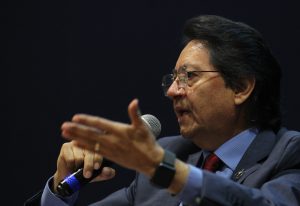
By Cristina Sanchez Reyes
Mexico City, Aug 27 (EFE).- The fight against cancer in Mexico needs to undergo a strategic course correction with better planning, providing patient-focused care and avoiding the fragmentation of the health care system, several experts agreed on Tuesday.
During the “A new paradigm for cancer care in Mexico” EFE Forum, organized by Agencia EFE, Spain’s international news agency, participants emphasized that the fight against cancer needs for public policies to be “standardized, there must be a consensus,” according to Dr. Abelardo Meneses, director of the National Cancer Institute (Incan).
He said that the change in government in Mexico can be taken advantage of to help get public policies under way leading to “prevention, timely diagnosis, rehabilitation, palliative care and financing that permeates all sectors.”
Meneses added that one of the challenges facing the Mexican health care system is raising people’s awareness about self-care, as well as refocusing the resources already available.
One of the barriers making the fight against the disease difficult in Mexico is the fragmentation of the health care system.
Currently, providing health services is done via institutions such as the Mexican Social Security Institute (IMSS), the Institute for Security and Social Services for State Workers (ISSSTE) and the Health Secretariat.

This has created a fragmented system that, according to Miryana Perez Vela Nieto, program director at the Rebecca de Alba Foundation, affects how patients get access to health care based on “their work status and, thus, the patients don’t know how they will get access and how they will be treated.”
Luis Alonso Herrera Montalvo, general director of the National Institute of Genomic Medicine, emphasized the importance of Mexico’s having launched the National Cancer Register, since it serves as a good design for public policies.
“The problems we’re facing cannot be prioritized if we don’t have enough data on our population to support the decisions,” he said.
Another of the issues making this battle tougher, the experts said, is the lack of resources, which not only affects the availability of medicines but also prevents the standardization of cancer management in Mexico.
“It’s important to guarantee that the patient has better participation, but the health care systems should also improve the care experience,” said Dr. Francisco Javier Ochoa Carrillo, president of the Mexican Association of the Fight against Cancer.
When personalized care is available, he said, patients are usually better informed, and they also get a better view of the specific risk and are involved in their health decisions.
Meanwhile, Victor Hugo Borja, the director of medical loans at IMSS, said that this disease must be dealt with in a multidisciplinary way, but detection and timely treatment must also be improved since “we can have third-level services, but the patients arrive too late.”
The experts also agreed that often patients do not have access to the latest medications, and Hector Valle Mesto, the executive president of the Mexican Health Foundation (Funsalud), said that the procedures for approving the use of medications can last up to four years, while in the developed countries the process only takes two years.
